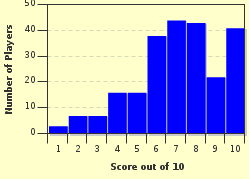Quiz Answer Key and Fun Facts
1. Which of the following best expresses the view that most scholars hold about 2 Corinthians?
2. Paul states in the first chapter that he had intended to visit Corinth. What reason does he give for not having done so?
3. Chapter 2 suggests that someone had been agitating against Paul. What does he say has happened to that person?
4. "But thanks be to God, who always leads us in triumphal procession in Christ and through us spreads everywhere ________________." (2 Corinthians 2 v. 14)
Which phrase completes this verse in the New International Version?
5. A major theme of the letter is that of weakness. One way that Paul conveys this is by talking about the treasure of the gospel being carried in what?
6. Paul further extends the weakness analogy by describing our human bodies as tents that will one day be torn down. What does he cite as the "deposit" guaranteeing the "eternal house" that is to come?
7. With whom, according to chapter 6, should the Corinthians avoid being yoked?
8. In chapter 10, Paul appears to be summarising the contents of a critical report drawn up by some in the Corinthian church. Which of these charges does it level against him?
9. Paul encourages the Corinthians to be generous in supporting a collection previously mentioned in his first letter. What was the purpose of this collection?
10. Paul provides many reasons why the Corinthians should be generous in their giving. Which of these does NOT appear in this letter?
Source: Author
glendathecat
This quiz was reviewed by FunTrivia editor
CellarDoor before going online.
Any errors found in FunTrivia content are routinely corrected through our feedback system.

